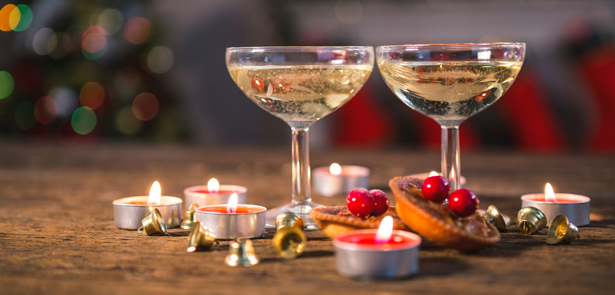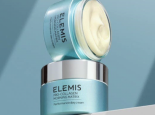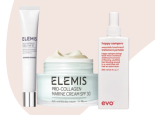Top tips for a healthy Christmas

It may be the season to be jolly, but it is also the season that can be most risky for our health. You can still enjoy all the festivities of the season without too much impact on your health and waistline – just follow these top tips to avoid your health slipping down the snow-covered slope...
1. Know your booze limits
For some of us, the festive season is a time of excess drinking and partying. It’s good to relax and socialise, but drinking too much too quickly on any single occasion can increase your risk of misjudging risky situations, of accidents resulting in injury and causing death in some cases, and of losing self-control, like having unprotected sex.
To reduce your health risks: limit how much you drink drink more slowly drink with food alternate with water or non-alcoholic drinks the long term, drinking than 14 units a week (about pints of average strength beer small glasses of low strength also lead to a wide range of health problems including stroke and heart attack. So at the festive season, why not consider signing up for Dry January and taking a month off alcohol?
2. Easy ways for a healthier Christmas dinner
Many of us will put on pounds during this Christmas season. We can eat 6,000 calories on Christmas Day alone, which is about three times as many calories as we need in a day. You can make this Christmas a healthy one and still enjoy delicious food. Christmas dinner can provide a healthier plate of food with just a few small changes. Removing the turkey skin before serving will reduce the fat intake. Cutting potatoes and parsnips bigger before roasting will reduce the fat they absorb. Fill one third of your plate with vegetables and avoid putting any butter or fat on these. If you still have room for dessert then serve Christmas pudding with low fat-custard try fruit salad instead. Resist the urge large portions or second helpings.
3. Stop the turkey knocking the stuffing out of you
December is one of the most common months for people to get food poisoning. Allow at least 48 hours to defrost a large turkey. Plan your cooking time in advance, allowing extra time if cooking the bird with stuffing. When you cut into the thickest part of the turkey, none of the meat should be pink and juices should be clear. Tips to avoid poisoning are to wash your hands often, and wash work tops before and after preparing foods. Avoid cross contamination by keeping raw meat, poultry, seafood, and eggs (including their juices) away from ready-to-eat foods and eating surfaces. Wash your veg and cook foods to the proper temperature. Refrigerate promptly and do not leave perishable foods out for more than two hours.
4. Overindulging on the snacks
It would be rather Scrooge-like to suggest that you don’t eat any treats over the festive period. But rather than mindlessly popping whatever is in front of you in your mouth, spend a moment thinking about whether you really want it, or are just eating it because it’s there. Wake up to breakfast for a healthy start to the festive season. Eating a healthy breakfast gives us energy and can help to cut down on morning snacking. Try adding seasonal fruits, like satsumas or dried cranberries, to wholegrain cereal or porridge for a festive start to your five-a-day. no more fruit than the satsuma in the Christmas stocking. It’s still important to get your five-a-day, to help you stay in good health throughout the party season. shopping list bowl and
5. Happy hydration
We need six to eight glasses of fluid every day to stay hydrated. Many soft drinks can be high in sugar, this adds to our calorie intake which can lead to weight gain. Plain or sparkling water are healthy choices, add a slice of citrus fruit for natural flavour. If you’re hosting, make big pitchers of water readily available everywhere.
6. The only white powder you want is snow
The party season can be a time when you feel put under pressure to try illegal drugs. The reality is that most people don’t take drugs, so if you refuse you’re in the majority. Try to understand who is offering you the drugs and why – friends should understand if you say no, people you don’t know very well may expect something in return. Since May 2016, it’s now illegal to supply drugs that used to be known as ‘legal highs’. These drugs are often tested on you, they come with little or no research into their effects, and in some cases can be as harmful as drugs which have been classed as ‘illegal’ for a long time. More information is available on the ‘Ask Frank’ website.
7. Kissing under the mistletoe
If you practise unsafe sex you may find yourself with an unwanted present of a sexually transmitted infection (STI) or pregnancy. STIs and pregnancy rates increase post-Christmas. Using a condom is the best way to keep you safe. Be prepared and carry a condom – carrying a condom means you’re looking after your sexual health. If you haven’t used a condom or it slips off during sex, you should get tested for STIs or emergency contraception, available up to 72 hours later. You can get free condoms, emergency contraception, or get checked and treated for STIs at the Integrated Contraception and Sexual Health (iCaSH) clinic at Kings Chambers, 39-41 Priestgate, PE1 1JL. The service is free and confidential, even if you are under 16. You can also get free online chlamydia testing at www.freetestme.com.
8. Burn off the excess and cobwebs
Aim to include some physical activity in your day to help burn off some of the additional calories eaten over Christmas, such as a post dinner walk with the family. Still aim to do your 150 minutes of physical activity each week – remember If you don’t want to ‘shake your belly like a bowl full of jelly’ it’s best to bypass the chocolate boxes and instead look for the healthier treats such as fruit and vegetable sticks or unsalted nuts. Let’s be honest, some of us get through the entire Christmas period eating Ensure that your Christmas shop enables you to fill up the fruit bo keep it within sight. that this can be as easy as half an hour a day of brisk walking, which makes a real difference to your health. Ice skating is a good form of cardio exercise that improves balance and co-ordination. A few lengths of a pool is a great low-impact exercise which works all the muscles, burns lots of calories and is good for stress-busting
9. Keep colds at bay
The flu vaccine can prevent you from catching flu – so if you are over 65, are pregnant, or have a long term condition that means you’re entitled to a free NHS flu vaccine, then it’s worth making sure you take this up through your GP surgery or some local pharmacies. Apart from that, the best way to protect yourself from bad colds and flu is to have a healthy lifestyle – eating a healthy diet, taking regular exercise and drinking plenty of warm drinks in the winter months. Cold temperatures won’t give you a cold on their own – but getting cold does allow the viruses which cause the common cold to multiply more quickly.
10. Keep warm, keep well
If you are an older person, a young child or have an ongoing health problem, cold winter weather can be bad for your health. Getting too cold can raise your risk of chest infections, and can also raise your blood pressure and increase your risk of heart attack or stroke. There are simple things you can do to reduce these risks and stay warm and well:
● Check that your boiler is working. Before a cold snap hits, it’s worth checking to see if your boiler is fully working. ● Heat your home to at least 18°C (65°F).You might prefer your main living room to be slightly warmer. Keep your bedroom window closed on winter nights. Because breathing cold air can be bad for your health as it increases the risk of chest infections. ● Eat well. Food is a vital source of energy, which helps to keep your body warm ● Keep active when you’re indoors. Try not to sit still for more than an hour or so. ● Wear several layers of light clothes. Because they trap warm air better than one bulky layer. ● Look after yourself. If you go out in the cold weather wear extra clothes. Don’t go out if it is too cold. ● Make sure you’re receiving all the help that you’re entitled to. Learn how to make your home more energy efficient, improve your heating and keep up with your energy bills at www.gov.uk/phe/keep-warm
For further information on these festive healthy tips visit www.healthypeterborough.org.uk















